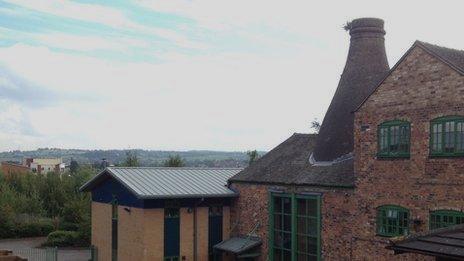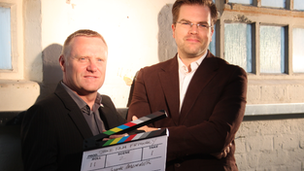Stoke-on-Trent: The next Hollywood?
- Published

Council leaders said Stoke's industrial heritage could make "great" backdrops for films
When you think about film locations, the first places that come to mind might include glamorous Los Angeles or the gritty East End in London.
Stoke-on-Trent might not feature at the top of that list. And unfairly so, its council leaders would say.
"Stoke has so much to offer film directors," said Mark Meredith, the city council's cabinet member for economic development.
"This is where the industrial revolution started - we have lots of amazing industrial buildings which would provide great backdrops and the canal network.
"But we also have a lot of green space too - more proportionally than most other cities.
'Warts and all'
"We have a creative past with the ceramic industry and we want to keep that creative tradition going."
With regards to the city's, perhaps, not-so glamorous reputation, Mr Meredith said they "should not be afraid of showing Stoke, warts and all".
"Like Trainspotting - that didn't show Edinburgh's best bits, but it didn't stop anyone going there," he added.
The city's leaders have now signed a "film-friendly" charter with Creative England to make it easier for production companies to come to the city.
It would mean that closing roads and other potential issues could be fast-tracked by the council and directors do not find themselves wading through bureaucracy.
By early next year, it is also hoped the Stoke Film Office will be set up to help deal with any film-making inquiries the city gets and Mr Meredith said they had already seen some interest from production companies.
Stephen Badham, from Creative England, said many other cities had been taking advantage of the fact many parts of London were not accessible for production companies in 2012 because of the Olympics.

Mr Meredith and Mr Badham said Stoke had a lot to offer film and TV directors
"We find more and more interest in moving out of London, where it's not so busy and the costs aren't so high," he said.
"Stoke has the great advantage of how accessible it is, and with more and more production companies based in Manchester, Salford and Leeds, it's a great place to get to from the North.
"But this isn't just about promoting the city to directors across the rest of the country and abroad - it's about encouraging homegrown talent too."
But some of Stoke's residents seemed less convinced.
"I can't see Guy Ritchie walking 'round Hanley any time soon," said Matthew Burton, from Dresden, in the city.
"No, Stoke's not renowned for its splendour," added his friend John Lowe, from Shelton.
"It'd do for films where you need bleak empty factories, but really the council should be ploughing more money into the city before showing it off to other people."
However, Linda Neale, from Fenton, said the city had a lot of heritage to be proud of.
"There's Trentham Gardens and Middleport Pottery, and they would both be good for period films and TV programmes," she said.
"But I don't know where all the directors and people would stay, except the £29-a-night hotel in Trentham."
Film maker Chris Stone was born in Stoke and has remained based in the city ever since because, he said, it made such a good location for shooting.
'Stoke's brilliant'
"I've shot everything - from things set in World War I and World War II to the Roman times and also a vampire series set in gothic Victorian times - and I've never had a problem with finding the right location," he said.
"It's brilliant.
"When I've gone over to the US, our stuff has always had a really positive reaction and people across the world are starting to realise there's more to Britain than London. I don't think you'd have trouble encouraging more people to come to Stoke to film."
Mike Rawlins, who runs the Pits 'n' Pots, external website about Stoke, said there had been a history of the city having a starring role in the past.

Peter Sellers starred in the 1957 film The Smallest Show On Earth, filmed in Longton
"It was used for Soul Boy, a film from a couple of years ago," he said.
"Stoke pretty much got the gig because the film was set in the 1970s, and Stoke's stuck in the 1970s.
"Seriously though, Stoke has some great examples of 1970s buildings, and that can play to its advantage.
"But if we can bring money into the city by exploiting those things, that's no bad thing."
He added that one of the city's six towns, Longton, had featured prominently in the 1957 Peter Sellers film The Smallest Show On Earth, while the Gladstone Pottery Museum was used in the 1986 Dr Who serial The Ultimate Foe.
Council leaders said they hoped word would spread of what Stoke had to offer.
"Of course, it's early days," added Mr Meredith. "But if Hollywood comes asking, we're not going to say no."
- Published25 January 2012